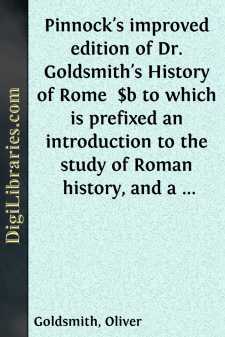Categories
- Antiques & Collectibles 13
- Architecture 36
- Art 48
- Bibles 22
- Biography & Autobiography 813
- Body, Mind & Spirit 142
- Business & Economics 28
- Children's Books 15
- Children's Fiction 12
- Computers 4
- Cooking 94
- Crafts & Hobbies 4
- Drama 346
- Education 46
- Family & Relationships 57
- Fiction 11829
- Games 19
- Gardening 17
- Health & Fitness 34
- History 1377
- House & Home 1
- Humor 147
- Juvenile Fiction 1873
- Juvenile Nonfiction 202
- Language Arts & Disciplines 88
- Law 16
- Literary Collections 686
- Literary Criticism 179
- Mathematics 13
- Medical 41
- Music 40
- Nature 179
- Non-Classifiable 1768
- Performing Arts 7
- Periodicals 1453
- Philosophy 64
- Photography 2
- Poetry 896
- Political Science 203
- Psychology 42
- Reference 154
- Religion 513
- Science 126
- Self-Help 84
- Social Science 81
- Sports & Recreation 34
- Study Aids 3
- Technology & Engineering 59
- Transportation 23
- Travel 463
- True Crime 29
Pinnock's improved edition of Dr. Goldsmith's History of Rome $b to which is prefixed an introduction to the study of Roman history, and a great variety of valuable information added throughout the work, on the manners, institutions, and antiquities...
by: Oliver Goldsmith
Description:
Excerpt
CHAPTER I.
GEOGRAPHICAL OUTLINE OF ITALY.
Italia! oh, Italia! thou who hast
The fatal gift of beauty, which became
A funeral dower of present woes and past,
On thy sweet brow is sorrow plough'd by shame,
And annals traced in characters of flame.—Byron.
1. The outline of Italy presents a geographical unity and completeness which naturally would lead us to believe that it was regarded as a whole, and named as a single country, from the earliest ages. This opinion would, however, be erroneous; while the country was possessed by various independent tribes of varied origin and different customs, the districts inhabited by each were reckoned separate states, and it was not until these several nations had fallen under the power of one predominant people that the physical unity which the peninsula possesses was expressed by a single name. Italy was the name originally given to a small peninsula in Brut'tium, between the Scylacean and Napetine gulfs; the name was gradually made to comprehend new districts, until at length it included the entire country lying south of the Alps, between the Adriatic and Tuscan seas. 2. The names Hespéria, Satúrnia, and Œnot'ria have also been given to this country by the poets; but these designations are not properly applicable; for Hespéria was a general name for all the countries lying to the west of Greece, and the other two names really belonged to particular districts.
3. The northern boundary of Italy, in its full extent, is the chain of the Alps, which forms a kind of crescent, with the convex side towards Gaul. The various branches of these mountains had distinct names; the most remarkable were, the Maritime Alps, extending from the Ligurian sea to Mount Vésulus, Veso; the Collian, Graian, Penine, Rhœtian, Tridentine, Carnic, and Julian Alps, which nearly complete the crescent; the Euganean, Venetian, and Pannonian Alps, that extend the chain to the east.[Pg. 12]
4. The political divisions of Italy have been frequently altered, but it may be considered as naturally divided into Northern, Central, and Southern Italy.
The principal divisions of Northern Italy were Ligu'ria and Cisalpine Gaul.
5. Only one half of Liguria was accounted part of Italy; the remainder was included in Gaul. The Ligurians originally possessed the entire line of sea-coast from the Pyrennees to the Tiber, and the mountainous district now called Piedmont; but before the historic age a great part of their territory was wrested from them by the Iberians, the Celts, and the Tuscans, until their limits were contracted nearly to those of the present district attached to Genoa. Their chief cities were Genúa, Genoa; Nicœ'a, Nice, founded by a colony from Marseilles; and As'ta, Asti. The Ligurians were one of the last Italian states conquered by the Romans; on account of their inveterate hostility, they are grossly maligned by the historians of the victorious people, and described as ignorant, treacherous, and deceitful; but the Greek writers have given a different and more impartial account; they assure us that the Ligurians were eminent for boldness and dexterity, and at the same time patient and contented....




